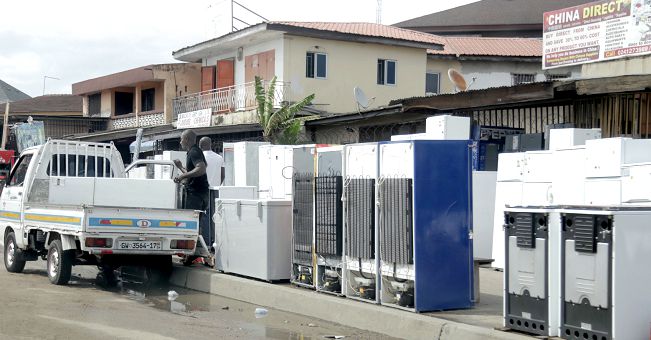
Second-hand fridges still flood markets; ban not enforced since 2008
The Energy Commission (EC) has cited political interference and the lack of political will as the major factors impeding efforts to strictly enforce the ban on the importation of second-hand refrigeration appliances.
According to the EC, since the ban was instituted in 2008, it had not been able to get approval for its work plan towards the implementation of the ban, which includes seizing the imported second-hand appliances from the market.
Advertisement
Speaking with the Daily Graphic, the Inspector in charge of Energy Efficiency and Renewable Energy at the EC, Mr Huber Nsoh Zan, explained that no Minister of Trade had been willing to sign the implementation work plan on the ban since it was instituted, for fear of making their governments unpopular.
That, he said, was unfortunate, considering the dire health implications and impact the use of the appliances had on the national grid.
He, therefore, called on politicians to back the ban with the needed political will to safeguard public health and also curtail power wastage to enhance the economy.
Health implications
Mr Zan indicated that aside from the high energy consumption characteristic of those products, majority of them were unhealthy for use because they had been used in mortuaries and hospitals abroad to store mutilated bodies from accidents and hospital vaccines.
Research conducted by the Noguchi Memorial Institute for Medical Research (NMIMR), he said, had established that even after rigorous washing of the appliances before sale, they still contained toxins that were harmful to human health.
Unknowingly, consumers patronise them because they were supposedly “cheap”.
In the end, however, the imported appliances turn out to be more expensive to run, as they consume more power than new and energy efficient ones.
Mr Zan said the second-hand refrigerators were harming the country, as they were not built for use in Africa and so consumed too much electricity and, therefore, had a toll on the national grid.
Customs challenges
Another major challenge militating against the enforcement of the ban was the inability of the Customs Division of the Ghana Revenue Authority (GRA) to clamp down on the smuggling of the goods through the ports into the country, he disclosed.
Mr Zan said due to inadequate personnel to examine all containers that arrived at the ports, Customs officials were unable to ensure that those goods did not leave the ports.
“The perpetrators have realised that containers labelled as household items were not strictly scrutinised and so they often brand their containers as household items, even though they carry the banned fridges, to outwit Customs, and they often succeed,” he stated.
In addition, dealers in the appliances always claimed to be still selling old stock imported before the four-year redundant period given to them to sell off their goods before the strict implementation of the ban, he said.
“Obviously, these dealers are taking advantage of the loopholes in the system to smuggle more goods into the system under the guise of household goods,” he added.
Inventory
Mr Zan said to plug the loopholes, the EC, as part of its work plan for 2020, had made it a policy to take inventory of all stocks on the markets and in warehouses.
“We have managed to get a database of these dealers to ensure that no new additions are made,” he said.
He emphasised that the current law was not punitive enough to deter people from importing the appliances “because offenders are only charged 12,000 penalty units, and a penalty unit is only GHc6.
The EC, he stated, was in the process of instituting more sanctions at the administrative level that would not require any amendments to the law but would be punitive enough.
He said those measures included surcharging perpetrators whose goods were seized to pay for the conveying and proper disposal of the seized goods.
Furthermore, it would collaborate with the Customs Division to ensure that smuggled goods did not go through the system and also ensure that perpetrators were made to pay 300 per cent of the actual duty on the goods, in line with GRA statutes, Mr Zan noted.
Old stock
Some of the dealers who spoke to the Daily Graphic said their products were old stock.
One of them, Mr Kofi Asare, said because they had been informed of the ban, they had imported more of their wares, which they kept in a warehouse and were now selling.
Background
In 2008, a ban was placed on the importation of second-hand refrigerators to help reduce wasting the national grid due to the high consumption levels of those products that had expired and were meant to be recycled in their countries of origin but are imported into the country for sale.
However, due to pleas by the dealers that they had already imported goods before the ban and that they needed time to sell off their goods, then President John Agyekum Kufuor gave a two-year grace period.
After the grace period, in 2010, the newly elected President John Evans Atta Mills also gave a two-year grace period on the request of the dealers, which ended in 2012, by which time Mr John Dramani Mahama had taken over as President following the demise of his predecessor.
The dealers made a similar request in 2012, but President Mahama granted them six months because they had enjoyed four years of grace period already, which made the ban come into full force in 2013.
Writer’s email [email protected]




